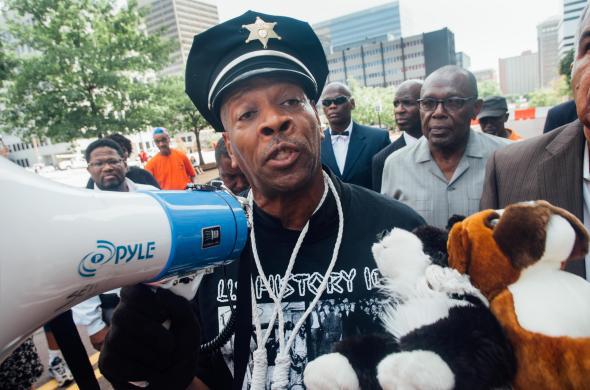CLAYTON, Missouri—Spencer Booker wants Robert McCulloch gone.
“The goal of this demonstration was to send a clear message to the governor: We don’t want Mr. McCulloch on this case. Let’s get a special prosecutor, and let this investigation take its course,” said Booker, a reverend at a nearby African Methodist Episcopal church.
Julia Davis was a little more emphatic. “He’s biased. He don’t like us. And we will not allow another executioner, murderer to go free.”
Both Davis and Booker were part of a demonstration Thursday afternoon, demanding that Gov. Jay Nixon remove McCulloch—the prosecuting attorney for St. Louis County—from the investigation into the fatal shooting of Michael Brown. The protest was small—a little more than 100 people had gathered at McCulloch’s Clayton, Missouri, office—but it came with wide support: Protesters and local groups have already collected 70,000 signatures calling for the prosecutor’s removal. Given the essential role McCulloch will play in what is to come, these demonstrations may now be the most important protests for the people of Ferguson.
McCulloch, who has held the office since 1991, insists he’ll conduct a fair, evenhanded investigation. “I appreciate and understand the concerns of those who honestly believe that I cannot or will not be fair to all in the gathering and presentation of the evidence pertaining to the tragic death of Michael Brown,” he wrote in a statement released Thursday. “Although I understand the concerns, and do not take lightly the demands that I recuse myself from this case, I also recognize that I have a responsibility to the family of Michael Brown, the people of Ferguson and the entire community.”
But supporters of the Brown family are skeptical, pointing to McCulloch’s personal and professional history.
To start, he has a close familial connection to violence. In 1964 his father—a police officer—was shot and killed by a black man in a public housing complex, which critics say affects his judgment of police brutality cases. In particular, they point to a case in which McCulloch declined to bring charges against two detectives accused of excessive force in the killing of two unarmed black men.
“McCulloch’s decision not to charge officers who murdered two unarmed African-American men in 2000 by shooting into their car 20 times,” writes state Sen. Jamilah Nasheed in a letter attached to the petition, “gives us no confidence that his office can provide a fair and impartial investigation into this current matter.”
Recent comments from McCulloch add fire to the criticism. Last Thursday he blasted Nixon for replacing St. Louis County police control of the Ferguson protests with officers and leadership from the Missouri State Highway Patrol. “It’s shameful what he did today, he had no legal authority to do that,” McCulloch said. “To denigrate the men and women of the county police department is shameful.”
And on Monday he praised police for how they’ve handled protests. “The abuse that they took on that line was incredible,” he said, in reference to the SWAT and riot teams on call in Ferguson in the early days of the protests. And while he added a caveat that the show of force may have been unnecessary as the week progressed, he didn’t think police behavior was beyond the pale. “The use of force, while they were doing it under the circumstances, I don’t think was excessive,” he said.
At the moment there’s no sign Nixon will replace McCulloch with a special prosecutor. “You have a democratically elected prosecutor,” Nixon said in a Tuesday interview with the St. Louis Post-Dispatch. “At times of stress to democracy, you need to look at the process that has served our state and country well.” And after questions over McCulloch’s involvement at an impromptu press conference on Thursday, Nixon told reporters, “[T]he best thing we could do is stay in our lanes and do our jobs.”
With that said, there’s a chance Nixon would bow to public pressure. After all, even with the disorder, sustained protests on West Florissant worked to force a response from the governor’s office, as well as other state and federal officials. Consistent calls for a special prosecutor—in addition to regular demonstrations—could force Nixon to act.
For my part, benching McCulloch makes sense. Given Missouri’s extremely high bar for prosecuting police officers, odds are good for disappointment in the grand jury investigation, which began Wednesday and will conclude in the fall. Still, a world where McCulloch declines an indictment looks a lot worse to the Ferguson community than one where someone else does the same. For the sake of public peace, a special prosecutor might be worth whatever political price it costs.
